|
|
|
. |
|
. |
|
. |
|
. |
|
Economic changes = Changes in communication |
||
|
Kind
of production |
Kind of L2 contact |
Kind of language learning required |
|
1. NAZIONAL |
letters/faxes |
scholastic English |
|
2. INTERNATIONAL |
Encounters |
language school English |
|
3. MULTINATIONAL |
Sojourns |
English
for IC* |
|
4. TRANSNATIONAL |
Episodes |
English
for IC |
Redefine basic terms:
![]() communicate
communicate
![]() language
language
![]() English
English
.
![]() communicate
= transmit message ?
communicate
= transmit message ?
.
.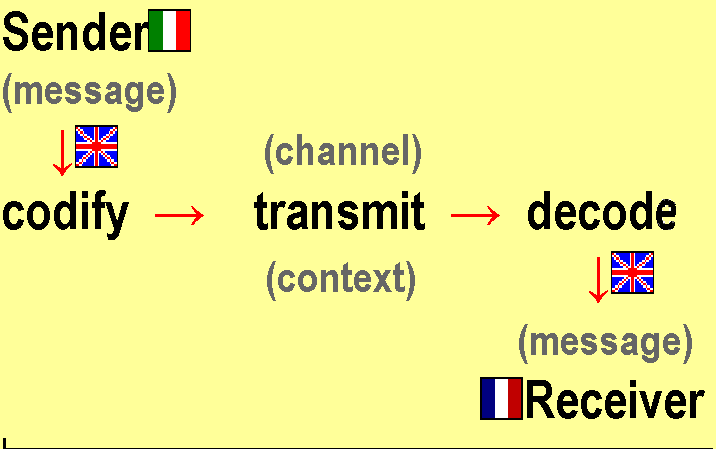
.
(Jakobson,
1982: 350-377 [1958])
![]() communicate
=
communicate
=
Establish
a relationship*
in
which to search for a common code
*presumption: concomitant changes are causal
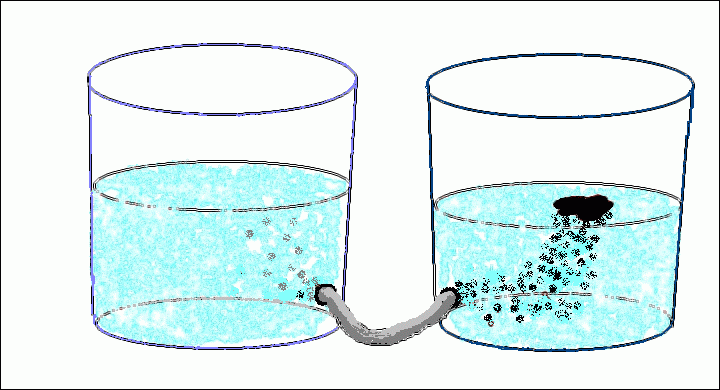
![]() language
= code* (words+rules) ?
language
= code* (words+rules) ?
*Physically: set of rules for signal/message conversion.
Semiotically: set of signs, i.e. lexical-syntactic oppositions.
But...  and...
and...  .
.
The
Piano ,
Jane Campion, 1992
OSU
Research News Service
![]() language
= behavioural
matrix* acquired/used in participating in communicative events.
language
= behavioural
matrix* acquired/used in participating in communicative events.
*Physically:
sedimented modulations of social behaviour.
Socially: disposition
to act/react understandably.
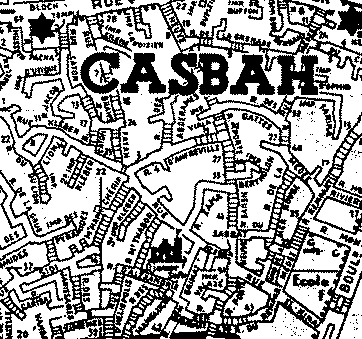 .
.
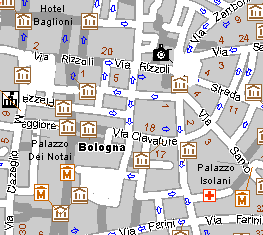 .
.
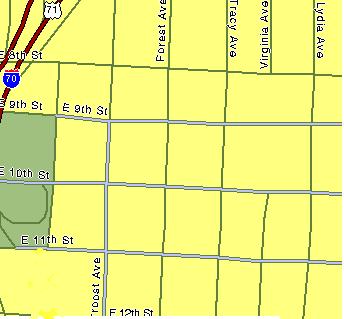
.
. . Algiers
. . . . . . . . . . . . . Bologna .
. . . . . . . . . . . . . Kansas
City
![]() English
= Official
language in Britain
English
= Official
language in Britain
and
most ex-British colonies ?
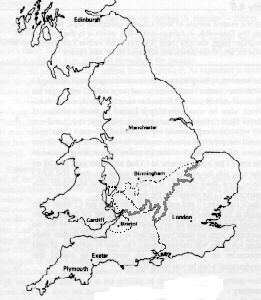

Great
Britian .
. . . . . . . . . .. . . .. . . . . . . .
. USA (Bush)
(Nashville)
Other
ES Countries
Communication
= Establishment of a relationship (search for a
common code).
.
Language
= Behavioural matrix (sedimentation of
modulations of communicative behaviour).
..
English
(1.) = Behavioural
matrix in which Anglo wills to mean*
produce Anglo ways
of being**.
.
*Anglo
wills to mean = culturally-connoted intents,
rendered by given resources: gestures, words, emblems... (USA:
"Hey" + take-5 greeting)
** Anglo
ways of being = matrix of various culturally-connoted
behaviours. (USA: emphatic greetings derive from Be
Positive ethos.)
.
N.B.
Autonomous
derivations: Anglo resources + non Anglo will to
mean/be.
ENGLISH (2.) = family of Anglo idioms
and autonomous derivations.
Applications
.
1.
Understanding an L2 = lexical
meaning is seen as the alogical sedimentation of behaviours and
intents characterizing a given situation:.
|
'tardi' |
'late' |
'en retard' |
|
'pulito' |
'clean' |
'propre' |
|
'pasto' |
'meal' |
'repas' |
|
'noi' |
'we' |
'nous' |
|
'ovest' |
'west' |
'ouest' |
Applications
2.
Translation = the act of
reproducing, in a different language, the communicative intent and
expressive ploys of a text, by (1.) reacting to it as might an
imaginary member of the original ratifying readership and, then, (2.)
as an imaginary member of the target readership, rewriting the text
as that person might, to render the epistemic, affective and volitive
reactions experienced.
Applications
.
3.
Intercultural encounter coach =
through briefings and
simulations, help a businessman or government representative to
interact better with interlocutors of another culture in negotiating,
presenting a project, resolving conflict, creating good will...)
(CLICK)
Applications
.4. Diversity expert = Work with governments, unions, voluntary organizations, etc. to help resolve the intercultural conflicts, both interpersonal and involving entire ethnic groups, caused by mishandled diversity.

(Click)
Also
see the following example of a coopeative for social
services:
http://www.interculturando.it/ -
http://www.interculturando.it/servizi.html
Conclusion: language student = ethnographer
(M. Byram, Developing Intercultural Competence in Practice. Multilingual Matters, 2001)
Skills for learning from the environment:
observe, transcribe, extrapolate, experiment;
internalize
subjectivities, manage on-going events.
. Tim Sebastian interviews Robert
Brown*
Tim Sebastian interviews Robert
Brown*
*wrongly imprisoned by Manchester
police for 25 years
(Hardtalk, BBC,
16.01.2003, 11.30 a.m. GMT)
SEBASTIAN;
You
signed the statement which incriminated you for
the murder of the 51-year-old woman. Did you realize
the gravity of what you were doing?
BROWN:
No, I did not realize the gravity of
it at all, I didn't realize the seriousness or the consequences of my
actions at that age. I mean, the... the... the statement isielf, it,
absolutely no real fact in it,the litt'l bits that were factual the
police (m)ade it up themselves
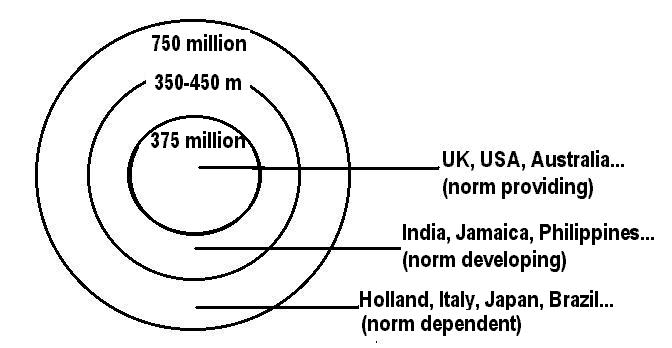
Hawaiian
creole English, *Tok
Pisin (New
Guinea English)
Shift in Norm Providers
. Sound
Sound Back..
Back..
M.
Leigh, Secrets and Lies, Channel Four Films,
London, 1996
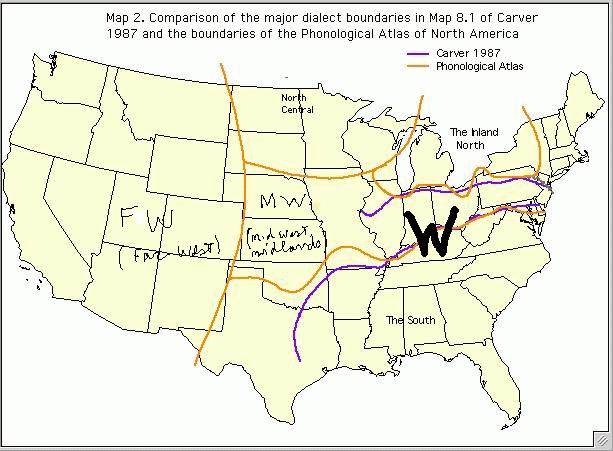
.
"Il
est parti vers l'ouest!" Où?
![]()

\
\
A U T O R E
L E T T O R
I
.......................¯........................................................¯.................................
STATO
-----------1-------------->
ESPRESSIONE ------------2------------>
STATO
X
X
X’
3
3
3

3
3
3
STATO------------4---------->ESPRESSIONE----------5------------->STATO
Y
Y
Y’
|
Manifestazioni
esteriori di condivisione di ethos |
|
|
ing.Saba |
Mr.York |
Mr.
Pak |
|
|
|
|
|
|
1. Distanza (in cm.) |
20_40_80_100 |
20_40_80_100 |
20_40_80_100 |
|
|
|
|
|
|
|
|
|
|
|
2. Presentazione (1 o +) |
|
|
|
|
stretta di mano |
[__] |
[__] |
[__] |
|
scambio biglietti visita |
[__] |
[__] |
[__] |
|
inchino (leggero) |
[__] |
[__] |
[__] |
|
inchino (profondo) |
[__] |
[__] |
[__] |
|
|
|
|
|
|
3. Sguardo |
|
|
|
|
giù per terra |
[__] |
[__] |
[__] |
|
giù, a volte su |
[__] |
[__] |
[__] |
|
su, a volte giù |
[__] |
[__] |
[__] |
|
su, negli occhi |
[__] |
[__] |
[__] |
|
|
|
|
|
|
|
|
|
|
|
4. Silenzi |
|
|
|
|
rari, brevissimi |
[__] |
[__] |
[__] |
|
brevi |
[__] |
[__] |
[__] |
|
lunghi |
[__] |
[__] |
[__] |
|
frequenti, lunghi |
[__] |
[__] |
[__] |
|
|
|
|
|
|
|
|
|
|
|
5. Per poter riflettere |
|
|
|
|
chiudere gli occhi |
[__] |
[__] |
[__] |
|
alzare la mano |
[__] |
[__] |
[__] |
|
guardare da un'altra parte |
[__] |
[__] |
[__] |
|
parlare di banalità |
[__] |
[__] |
[__] |
|
|
|
|
|
|
|
|
|
|
|
[...] Parlare |
|||
|
|
|
|
|
|
6.Delegazione. Parla: |
|
|
|
|
il capo |
[__] |
[__] |
[__] |
|
un portavoce |
[__] |
[__] |
[__] |
|
il responsabile settore |
[__] |
[__] |
[__] |
|
chiunque abbia da dire |
[__] |
[__] |
[__] |
|
|
|
|
|
|
|
|
|
|
|
7. Prendere la parola |
|
|
|
|
segnale ("ehm...") |
[__] |
[__] |
[__] |
|
"Posso?" / "May I?" |
[__] |
[__] |
[__] |
|
"Sì, ma..."/"Yes, but..." |
[__] |
[__] |
[__] |
|
sovrapposizione parlato |
[__] |
[__] |
[__] |
|
|
|
|
|
|
|
|
|
|
|
8. Appellativo |
|
|
|
|
"ingegnere" / "Engineer"" |
[__] |
[__] |
[__] |
|
"ing. [cogn.]" "Engineer [cogn.]" |
[__] |
[__] |
[__] |
|
"Mr. [cognome]" |
[__] |
[__] |
[__] |
|
"[nome]" |
[__] |
[__] |
[__] |
|
|
|
|
|
|
|
|
|
|
|
[...] Temi, Conduzione... |
|||
|
|
|
|
|
|
9. Temi iniziali (1 o +) |
|
|
|
|
vantaggi (performance.) |
[__] |
[__] |
[__] |
|
vantaggi (economici) |
[__] |
[__] |
[__] |
|
informazioni sull'aziende |
[__] |
[__] |
[__] |
|
altri clienti dal suo paese |
[__] |
[__] |
[__] |
|
|
|
|
|
|
|
|
|
|
|
10. Decidere (se possibile) |
|
|
|
|
lì per lì |
[__] |
[__] |
[__] |
|
lì per lì (da confermare) |
[__] |
[__] |
[__] |
|
dopo consultazioni in sede |
[__] |
[__] |
[__] |
|
dopo scambio scritto |
[__] |
[__] |
[__] |
|
|
|
|
|
©2003 – Patrick
Boylan, Dipartimento di Linguistica, Università di Roma
Tre
Materiali sulla comunicazaione interculturale su:
www.boylan.it
Definition of culture?
How
to represent a cultural matrix?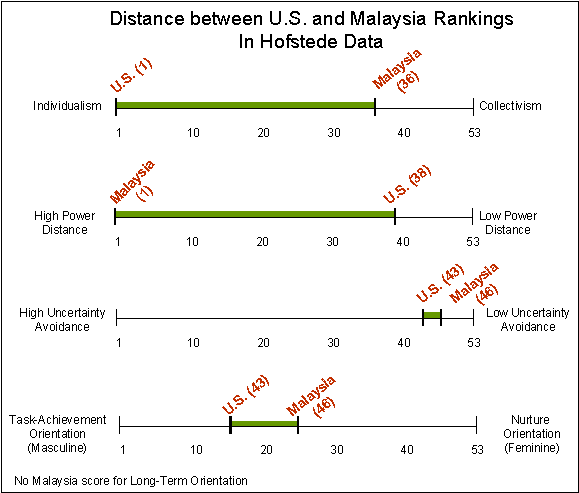
G.
Hofstede, Culture's Consequences: International Differences in
Work-Related Values,1980.
Distribution
of middle American cultural/communicative traits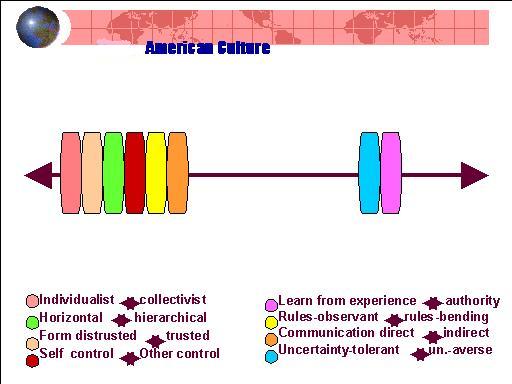
(L.
Beamer, http://www.dialogin.com, 2001)
Comparison
of cultural styles to identify points of friction.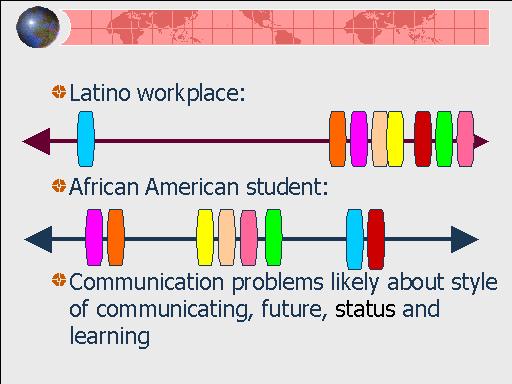
(L.
Beamer, http://www.dialogin.com, 2001)
 One
researcher's definition
One
researcher's definition
of cultural parameters...
Others:
G.
Hofstede
F. Trompenaars
V. Merk
L'obiettivo
oggi:
comunicare interculturalmente
non
"parlare l'inglese 'bene'
(tranne
in incontri con inglesi colti)
English
Dialects
non
(solo) "risultare simpatico"
ma risultare
convincente
Cosa significa (risposta di gruppo)